Yield to ancient traditions and discover the profound implications of dowries in biblical times, influencing marriage and society then and now.
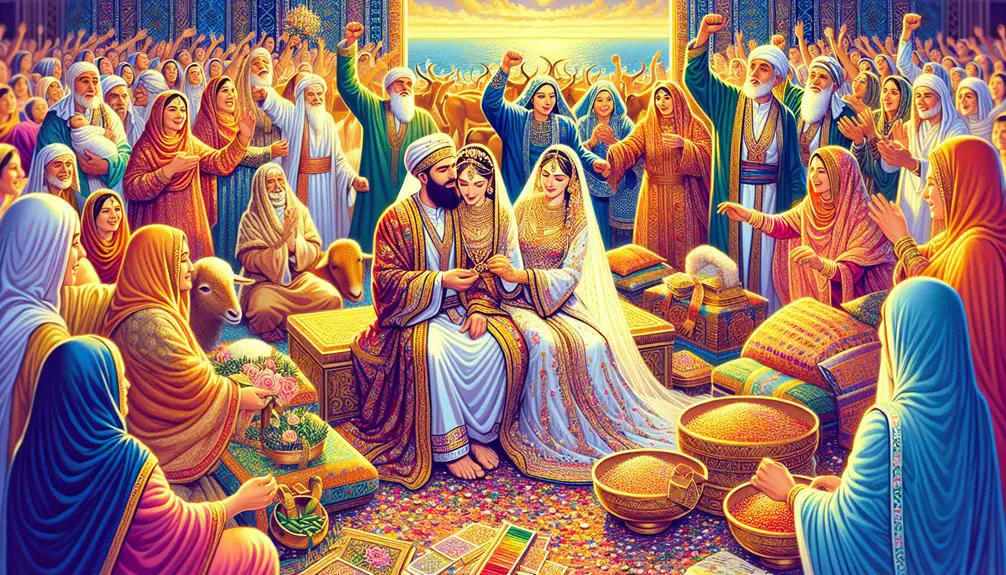
What Is a Dowry in the Bible
In the good old days, before dating apps and social media, people in biblical times had their own version of 'relationship insurance' known as a dowry.
You might find yourself chuckling at the thought, but this practice was no laughing matter. It held significant economic, social, and spiritual implications that shaped marriages and family dynamics.
As you explore the historical context and the specific practices detailed in the Old Testament, you'll uncover a fascinating blend of tradition and symbolism.
But don't stop here; there's much more to unravel about how these ancient customs influence our understanding of matrimonial alliances and their legacy in modern times.
Key Takeaways
- Dowries in the Bible provided financial stability and cemented social alliances between families.
- They reflected the economic and social status of families, acting as a form of inheritance for the bride.
- Biblical dowry practices included negotiations, land requests, and service in lieu of traditional dowry forms.
- The concept of dowry in biblical times symbolized the covenant relationship and honored the value of the bride.
Defining Dowry in Biblical Times
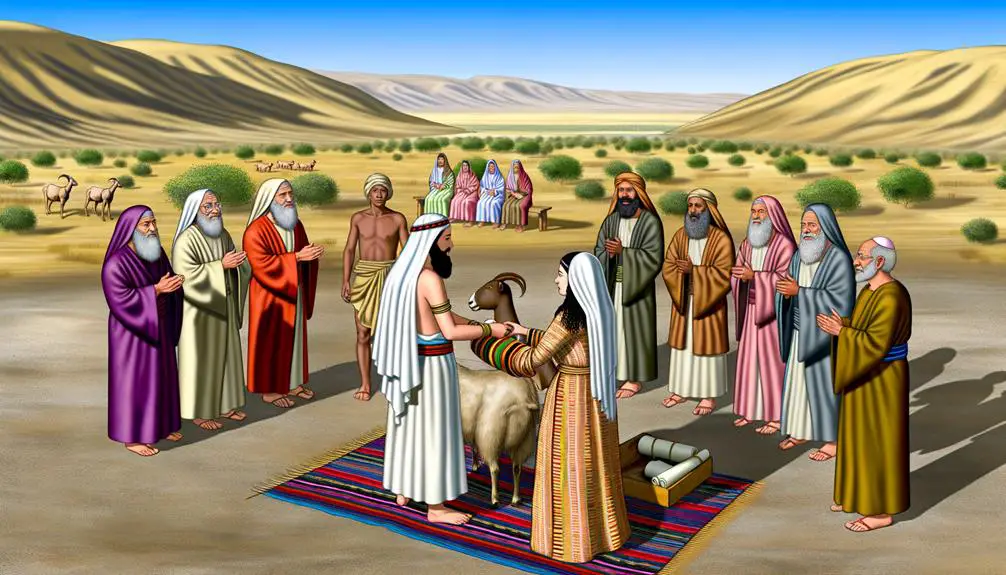
In biblical times, a dowry served as a pivotal financial transaction that facilitated marriage, underscoring the socio-economic dynamics of ancient societies. This practice was deeply embedded in the fabric of these communities, acting as a bridge between families during marriage negotiations. It's critical to understand that a dowry wasn't merely a gift; it was a complex institution that reflected the values and economic structures of the time.
The concept of the bride price, integral to these negotiations, often gets conflated with dowry, yet they serve distinct roles. While the bride price was a payment made by the groom or his family to the bride's family, a dowry represented a transfer of wealth from the bride's family to the bride herself, or to the couple. This distinction is crucial in appreciating the nuances of marriage transactions in biblical times.
Marriage negotiations were elaborate processes, with the dowry at their core. These weren't just simple exchanges but involved significant deliberation and valuation, reflecting the bride's social and economic standing. The dowry could include various forms of wealth, such as land, money, or movable goods, and served multiple purposes. It acted as a form of security for the wife, providing her with economic protection in the event of her husband's death or divorce.
Analyzing dowries in biblical times offers insights into the socio-economic stratification and gender dynamics of ancient societies. It highlights how marriage negotiations weren't just about uniting two individuals but were strategic engagements that involved intricate financial considerations, with the dowry playing a central role in these transactions.
Historical Context and Importance
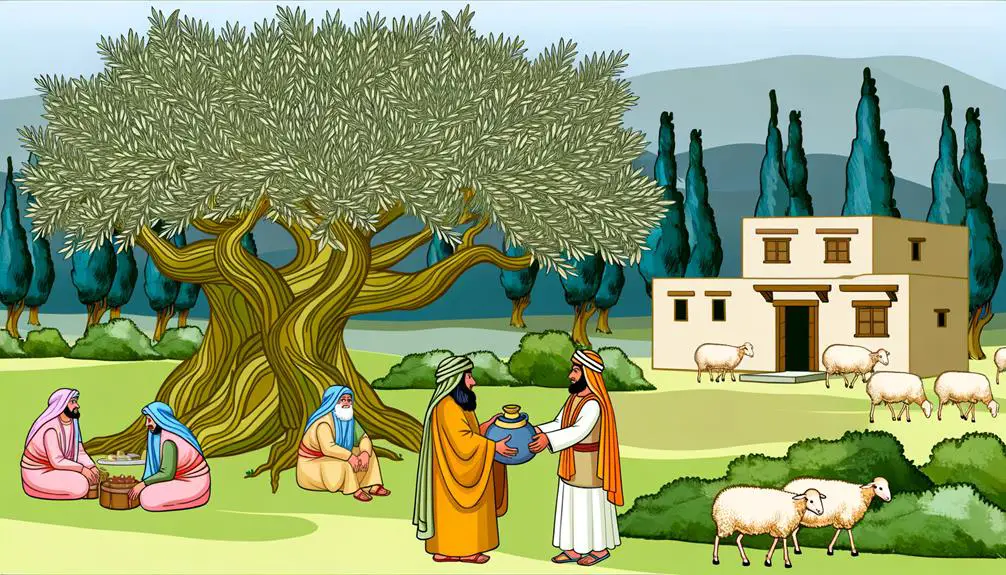
You must consider the intricate fabric of ancient marriage customs to truly grasp dowry's role and value. These practices were deeply interwoven with societal norms and economic structures, highlighting dowry's significance beyond mere tradition.
Ancient Marriage Customs
Ancient marriage customs, deeply embedded within societal frameworks, significantly influenced the social and economic structures of their times. Central to these practices were the bridal journey and wedding feasts, events that not only celebrated the union but also solidified alliances and transferred social status.
In analyzing these customs, consider the following:
- Bridal journey: Symbolized the transition of the bride from her family to her new home.
- Wedding feasts: Served as a public declaration of the union.
- Social status: Marriage could elevate an individual's or family's societal standing.
- Alliances: Marriages often served to forge political or economic alliances.
- Economic transfer: Goods, property, or money changed hands, strengthening the bond between families.
Understanding these customs sheds light on the complex interplay between personal relationships and societal obligations.
Dowry's Role and Value
Building on the foundation of ancient marriage customs, let's explore the significance of dowry within these societal frameworks, highlighting its role and value historically.
Traditionally, dowries served as a form of security for the bride, ensuring her financial stability within the marriage. This practice, deeply embedded in cultural and religious traditions, reflected the economic and social status of both families involved.
Modern interpretations of dowry have evolved, yet the essence remains influenced by historical practices and cultural variations. Understanding these shifts requires analyzing the socio-economic factors that have shaped dowry's significance over time.
As we delve deeper, it's clear that dowries, while variable in nature, have consistently played a pivotal role in marriage dynamics, reflecting broader societal values and norms across different cultures and epochs.
Dowry Practices in the Old Testament

You'll find that the Old Testament outlines specific practices regarding dowries, serving as a critical lens through which to understand marital and familial structures of the time.
This section will examine dowry's definition and purpose, highlight notable examples, and explore the laws governing these practices.
Through this analysis, you'll gain a comprehensive understanding of how dowries influenced social and legal norms within ancient Hebrew society.
Dowry's Definition and Purpose
In the Old Testament, the concept of dowry served as a pivotal marital institution, encapsulating various socio-economic and familial obligations. This practice, deeply rooted in ancient traditions, has evolved over the centuries, with modern interpretations and cultural differences shaping its current understanding. Analyzing the dowry's role reveals its multifaceted purpose:
- To provide financial stability for the newlywed couple.
- To cement social alliances between families.
- As a form of inheritance for the bride.
- To offer compensation to the bride's family for her departure.
- As a safeguard for the wife in case of widowhood or divorce.
These points underscore the dowry's complexity, illustrating how it intertwines with socio-economic structures and family dynamics, reflecting the society's values and norms at that time.
Notable Dowry Examples
Having explored the multifaceted purpose of dowry within the Old Testament's socio-economic and familial contexts, we now examine specific examples that highlight its practical application and significance in ancient times.
Example |
Significance |
|---|---|
Jacob's service |
Instead of a traditional dowry, Jacob served 14 years for his wives, illustrating a non-monetary form of dowry exchange. |
Caleb's daughter |
She requested additional land as part of her dowry, emphasizing negotiations and dowry's role in securing future prosperity. |
Dowry disputes |
Instances of conflicts over dowry terms underscored its importance in marital arrangements and family honor. |
Dowry abolition |
Calls and movements against dowry practices reflected evolving views on women's rights and social justice within biblical narratives. |
These examples underscore dowry's complex role in biblical societies, intertwined with economic, familial, and social dimensions.
Laws Governing Dowries
Dowry practices in the Old Testament, governed by specific laws, reveal the intricate balance between familial obligations and societal norms. These regulations were meticulously designed to navigate inheritance laws and dowry disputes with precision, ensuring the preservation of wealth within families and the fair treatment of daughters.
- Inheritance laws tightly controlled the distribution of property, directly influencing dowry arrangements.
- Dowry disputes were often resolved through detailed legal frameworks, emphasizing fairness and equity.
- Daughters' protection and rights were embedded within these regulations, highlighting their importance in familial structures.
- These laws facilitated the transfer of wealth, ensuring financial stability for the newlyweds.
- The dowry system acted as a bridge between the individual family unit and the broader societal expectations.
This complex system underscores the significance of dowries in ancient Hebraic society, intertwining legal, familial, and social threads.
Scriptural Examples of Dowries
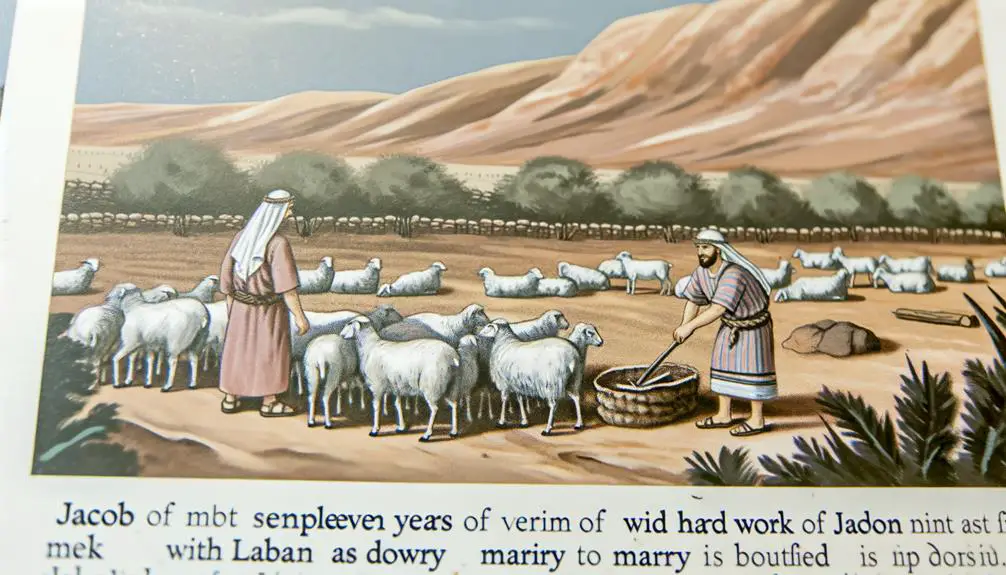
Several instances within the Bible illustrate the custom of dowries, shedding light on its cultural and religious significance. This tradition, deeply embedded in the society of the time, involved negotiations that often took into account the bride's consent, highlighting its importance beyond mere transactions. Dowry negotiations weren't only about agreeing on the terms but also about recognizing the value and the rights of the woman involved. This aspect of dowry practices underscores the consideration of personal consent, which played a pivotal role in these ancient agreements.
For example, the story of Jacob working for Laban to marry Rachel vividly depicts the concept of a dowry. Instead of a direct transfer of goods or money, Jacob's service for fourteen years essentially served as the dowry. This narrative emphasizes the effort and commitment involved in dowry practices, rather than solely focusing on the material aspects.
Similarly, the tale of Moses and Zipporah introduces another dimension where dowry comes into play. Moses' marriage to Zipporah, after he helped her and her sisters water their flock, indirectly touches upon the idea of service and alliance as forms of dowry.
These scriptural examples offer a nuanced understanding of dowries in biblical times, revealing a complex interplay of negotiations, consent, and societal values. It's clear that dowries weren't just about wealth transfer but also about establishing mutual respect and obligations between families, with the bride's consent as an essential component.
The Role of Dowry in Marriages
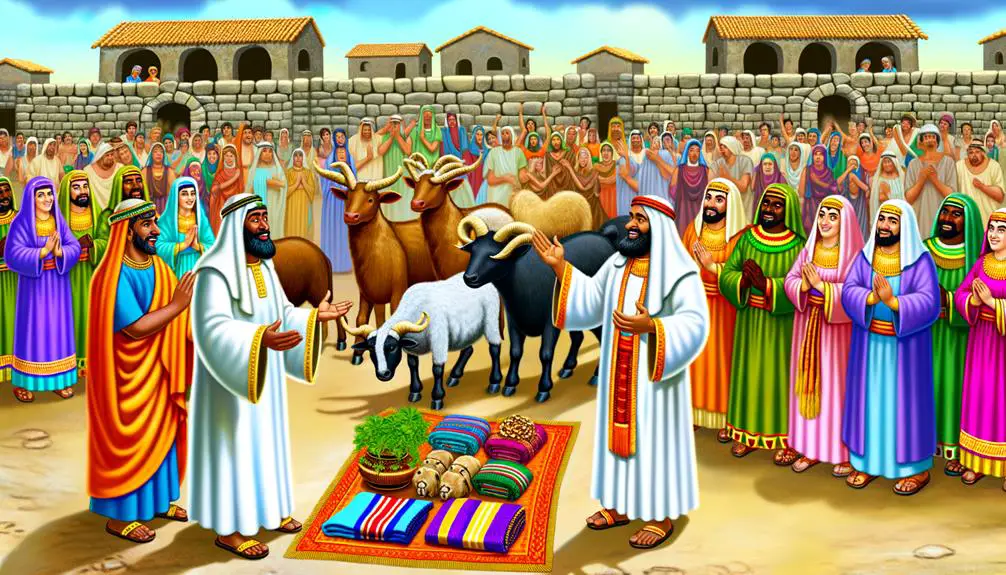
In analyzing the role of dowry in marriages, it's essential to recognize its multifaceted implications on familial relationships and societal structures. Historically, dowries have played a pivotal role in defining marriage rituals and reinforcing traditional gender roles within various cultures, including those represented in biblical contexts.
The practice of dowry, deeply embedded in the matrimonial traditions of many societies, serves as a bridge between the families of the bride and groom, often dictating the dynamics of the marriage. This exchange, varying in form from monetary assets to goods and property, has traditionally underscored the economic and social value placed on marriage alliances.
Dowries have historically:
- Solidified social ties and alliances between families.
- Acted as a form of inheritance for the bride, ensuring her financial security.
- Influenced the perceived value and marital prospects of a woman within her community.
- Reinforced gender roles by emphasizing the financial responsibilities of the groom's family and the economic value of the bride.
- Shaped marriage rituals, with the negotiation and transfer of dowry becoming central ceremonies in many cultures.
This practice has left a lasting impact on how marriages are perceived and conducted, emphasizing the transactional nature of matrimonial alliances. While dowries have facilitated the formation of strategic alliances and provided economic security for women in certain contexts, they also reflect and perpetuate patriarchal values, casting marriages within a framework where women are often valued for their economic rather than personal attributes.
Understanding the role of dowries in biblical times offers insight into the complex interplay between gender roles, marriage rituals, and societal values.
Economic and Social Implications
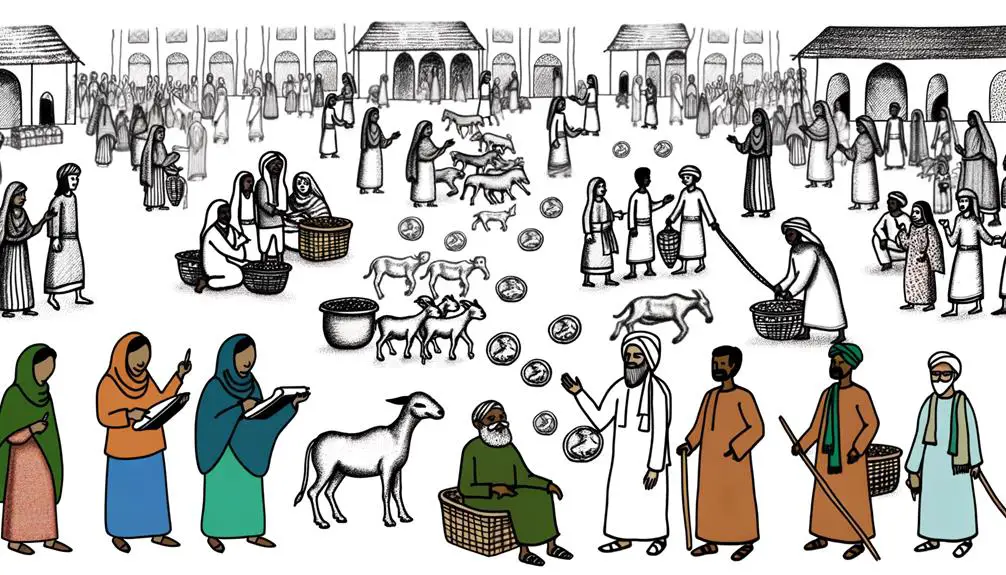
Exploring the economic and social implications of dowry practices reveals their profound impact on both family structures and societal norms. At its core, the dowry system can exacerbate gender inequality by positioning women as commodities in the marriage market. This perception not only devalues women's contributions outside the marital context but also pressures families to provide substantial dowries, reinforcing the notion that a woman's worth is tied to her dowry. The financial burden of dowries on the bride's family is significant, often leading to economic strain or indebtedness. This strain can deter families from investing in daughters' education or health, further entrenching gender disparities.
Moreover, the dowry practice has wider societal implications, influencing marriage dynamics and perpetuating social hierarchies. Families with higher dowries are often perceived as more desirable, skewing marital choices and reinforcing class divides. In communities where dowries are prevalent, there's a tendency to prioritize sons, who are seen as financial assets, over daughters, viewed as economic liabilities due to the dowry expense. This preference can lead to skewed gender ratios and a devaluation of female life, impacting community social structures and relationships.
Spiritual Symbolism of Dowries

Dowries, within a biblical context, are imbued with spiritual symbolism that transcends their material value, reflecting deeper notions of covenant, honor, and familial lineage. This spiritual symbolism is woven into the very fabric of biblical narratives, suggesting that dowries aren't merely transactions but carry significant spiritual inheritance.
You'll find that dowry symbolism in the Bible is multifaceted, representing:
- A covenant relationship: It signifies a binding agreement, not just between two individuals, but between their families, and, by extension, with God.
- A symbol of honor and value: The dowry elevates the status of the bride, acknowledging her worth and the esteem in which she's held by her family and her future husband.
- A form of spiritual inheritance: It's a tangible expression of the blessings and promises passed down through generations, linking the past, present, and future.
- An act of faith and trust: The giving of a dowry reflects a family's trust in God's provision and the future He's ordained.
- A testament to familial lineage and legacy: It preserves the memory and heritage of a family, ensuring that their legacy is remembered and honored in the marriage covenant.
Through these dimensions, dowries in the Bible serve as a complex symbol of spiritual truths. They aren't just material gifts but are laden with meanings that point to the spiritual inheritance passed from one generation to another. This spiritual dimension of dowries underscores the profound depth of marital and familial relationships as envisaged in the biblical tradition.
Dowry's Legacy in Modern Times

The legacy of dowries transcends ancient texts, significantly influencing modern societal structures and individual perceptions of marriage and familial bonds. You'll find that modern legislation often grapples with the implications of dowries, striving to balance traditional practices with contemporary standards of gender equality. This delicate balance is crucial in areas where dowries are still prevalent, as they can sometimes perpetuate gender-based disparities and economic inequalities.
Aspect |
Influence on Modern Times |
|---|---|
Legal Framework |
Modern laws aim to regulate or abolish dowries to promote gender equality and protect women's rights. |
Cultural Beliefs |
Despite legal efforts, the persistence of dowry practices reflects deeply ingrained cultural values. |
Economic Impact |
Dowries can contribute to financial strain on families, influencing marriage decisions and gender dynamics. |
In analyzing the legacy of dowries, it's clear that while some regions embrace modern legislation to discourage dowry practices, cultural beliefs often maintain a strong foothold, challenging the progress toward gender equality. The economic impact, too, cannot be understated, as the financial burden of dowries continues to shape decisions around marriage, often to the disadvantage of women and their families.
Ultimately, the interplay between tradition and modernity in the context of dowries reveals a complex landscape. Efforts to promote gender equality through modern legislation are commendable, yet the enduring cultural resonance of dowries serves as a reminder of the persistent challenges in fully eradicating practices that can perpetuate inequality. As societies evolve, the legacy of dowries underscores the ongoing dialogue between preserving tradition and advancing towards a more equitable future.
Frequently Asked Questions
How Did Dowry Practices in Biblical Times Influence Gender Roles and Expectations Within the Family and Broader Society?
In biblical times, dowry practices significantly shaped gender roles and expectations within families and society.
Through marriage rituals, dowries established women's economic value and secured their position within the family inheritance.
This system reinforced a societal structure where men were seen as providers and women as property to be exchanged.
Consequently, it perpetuated gender inequality, influencing how women were perceived and treated in both the family and broader society.
Were There Any Notable Exceptions or Variations to Traditional Dowry Practices Among Different Tribes or Regions Mentioned in the Bible?
In your deep dive into historical practices, you'll find that tribal distinctions and geographic influences indeed played roles in the variations of dowry practices. These nuances highlight the complexity of ancient customs, showing that one size didn't fit all.
While the core concept of dowry was widespread, specific practices could vary significantly across different tribes and regions, underlining how cultural and environmental factors shaped societal norms and expectations in those times.
How Did Early Christian Communities View and Adapt the Dowry Practices Mentioned in the Old and New Testaments?
Early Christian communities adapted dowry practices from the Old and New Testaments through a lens of religious interpretations and the formation of marriage alliances.
You'll find that these groups often reinterpreted traditional dowries, balancing them with emerging Christian values.
They scrutinized old customs and, when necessary, adjusted them to fit new religious and societal norms, all while maintaining the essential purpose of supporting marriage alliances within their evolving faith context.
Are There Examples of How Dowries Were Negotiated or Disputed in Biblical Narratives, and What Were the Outcomes of Such Negotiations?
You're diving into dowry origins and cultural significance by examining biblical narratives.
These stories often show dowries being negotiated or disputed, reflecting the cultural weight and societal norms of the times.
Through analyzing these accounts, you'll understand how dowries were more than just transactions; they were deeply embedded in the social fabric, influencing relationships and outcomes.
This exploration offers a unique lens to appreciate the historical and cultural layers of dowry practices.
How Have Contemporary Religious Scholars or Theologians Reinterpreted the Concept of Dowries in the Bible in Light of Modern Views on Marriage and Gender Equality?
You're diving into how scholars have flipped the script on dowries, blending modern legislation and feminist theology to challenge old norms.
They're not just dusting off ancient texts; they're asking big questions about marriage and gender equality.
Through a scholarly lens, they've dissected and reimagined the concept, proving it's not just about historical curiosity but about how we understand and enact relationships today, all while keeping an analytical, objective stance.
Conclusion
In your journey through the sands of time, you've uncovered the dowry's roots, deeply embedded in biblical soil. This ancient practice, more than a mere transaction, symbolized a covenant, weaving together the fabric of families and societies.
As you reflect on its enduring legacy, consider how the dowry, like a river through the ages, has carved its path, shaping norms and echoing values.
In its wake, the dowry leaves a complex legacy, challenging us to ponder its influence in the tapestry of modern relationships.



Sign up